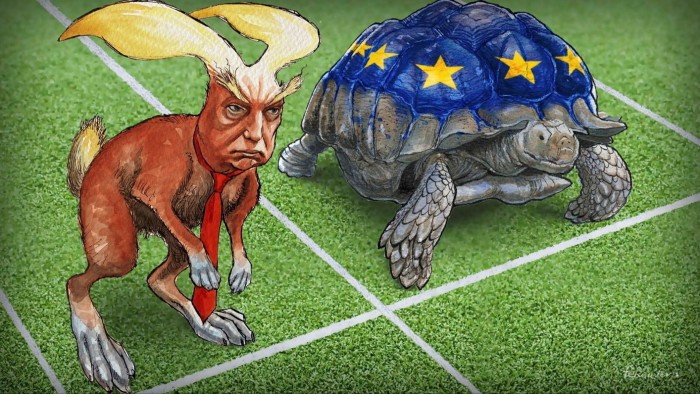Stay informed with free updates
Simply sign up to the EU trade myFT Digest — delivered directly to your inbox.
Like Donald Trump, the EU prides itself on its mastery of the art of the deal. The trademark Brussels event is a summit that ends at three in the morning, with weary negotiators emerging with a complex new accord.
The EU’s way of dealmaking is almost the precise opposite of the White House style. The US president is impulsive, fast-moving, makes extreme demands and is willing to break all the rules. The Europeans are legalistic, methodical and constantly looking for compromises and trade-offs.
The Trump style is flashier and makes for better headlines. The EU’s is deadly dull but much more effective.
The question of which kind of dealmaking — Brussels boredom or Mar-a-Lago mayhem — works better is more than a matter of pride. The future of the world economy could hang on it. Both the EU and the US are currently trying to come up with new trade deals. They also urgently need to settle their own differences before early July, when Trump’s 90-day pause on his “reciprocal” tariffs with the EU is scheduled to run out.
The EU-US trade relationship in goods is considerably larger than the flow between the US and China. And the transatlantic trade in services is also much more intense.
America’s tariffs on EU goods currently stand at 10 per cent. But they are set to rise to 20 per cent in July. The EU is also hit hard by America’s 25 per cent tariffs on cars, steel and aluminium, with the threat of further tariffs for pharmaceuticals.
With so much at stake, the European Commission is doing its utmost to de-dramatise its trade battle with the Trump administration — and to avoid turning it into an ideological struggle or a trial of strength.
But Brussels bureaucrats have found dealing with their Washington counterparts bewildering. One of the biggest problems is that it is unclear who in the Trump administration has any real authority to negotiate.
The Europeans are offering to buy more American produce, but they cannot accept permanent tariffs at the current levels. Some in Brussels fear that, come July, the Trump administration will simply extend the current regime for another 90 days of negotiating time.
At that point, the EU will have decisions to make. Does it finally retaliate and at what level? The general assumption is that the Europeans will feel compelled to hit back. The next question is whether retaliation will be restricted to trade in goods, where the EU has more to lose and its car industry is particularly vulnerable.
American tech companies are a much juicier target than manufacturers of Harley-Davidsons or Bourbon. But the Brussels mandarins also have to consider the possibility that the Trump administration would respond to tech sanctions asymmetrically by pulling US troops out of Europe. That would make Europe much more vulnerable to Russian aggression.
Given these unappealing options — and the unpredictability of the White House — the Europeans are doing what comes naturally: taking their time and moving cautiously. Just over a month has passed since Trump’s “liberation day” tariffs were announced and a huge amount has already changed. The one safe bet is that there will be a lot more turmoil over the next 60 days.
Like the Chinese, the Europeans are waiting to see if gaps start appearing on American supermarket shelves. They also know that potential tariffs on pharmaceuticals, while very painful for Europe, could spark a backlash in the US as essential medicines shoot up in price.
The best-case scenario for the Europeans is that the contradictions and self-harm in the Trump tariffs become increasingly evident in the run-up to July, leading to Europe being offered a much better deal than currently seems likely.
The European Commission is determined not to allow all its negotiating energy to be sucked up by a damage-limitation exercise with the US. One consequence of Trump’s global tariff war is that there is a significant increase in the countries that want to negotiate trade deals with the EU.
Piyush Goyal, the Indian trade minister, was in Brussels last week. A new accord is likely to be signed between the UK and the EU later this month — clearing away some of the most difficult issues left behind by Brexit. The United Arab Emirates opened free trade negotiations with the EU a few weeks ago. Trade talks with Australia, long stalled, have restarted. A deal with Latin America’s Mercosur bloc has already been agreed and awaits ratification. China is also keen to warm up trade relations with Brussels — although the Europeans will proceed cautiously there.
The countries that are beating a path to Brussels will find the EU slow moving and bureaucratic. A deal that Trump would aim to get over the line in weeks will take years to complete with the EU. On the other hand, as one Australian trade negotiator puts it: “The good thing about the EU is that if you do eventually do a deal with them, you know they’ll stick to it.”
The EU has already agreed roughly twice as many free trade agreements as the US and is well placed to conclude more. The Brussels art of the deal has its own peculiarities and frustrations. But it is considerably more serious and durable than the Trump version.
gideon.rachman@ft.com


